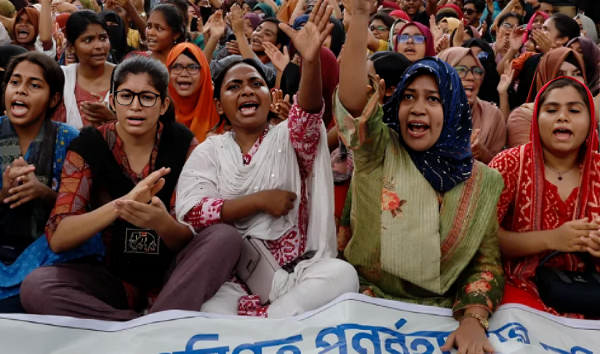-
16:40
-
16:20
-
16:00
-
15:40
-
15:20
-
15:00
-
14:40
-
14:20
-
14:00
-
13:30
-
13:00
-
12:30
-
12:00
-
11:30
-
11:00
-
10:40
-
10:20
-
10:00
-
09:40
-
09:20
-
09:00
-
08:40
-
08:20
-
08:00
-
07:30
-
07:00
Bangladesh Overhauls Job Quota System Amidst Nationwide Turmoil
In a landmark decision that has sent shockwaves through Bangladesh's political landscape, the Supreme Court has dramatically reduced the longstanding quota system for government jobs. This ruling comes in the wake of widespread unrest that has claimed over 100 lives and paralyzed major cities across the nation.
For decades, Bangladesh had reserved one-third of its public sector positions for descendants of veterans who fought in the 1971 war of independence against Pakistan. However, the recent court verdict has slashed this quota to just 5%, mandating that 93% of government jobs now be filled based on merit. The remaining 2% continues to be allocated for ethnic minorities and individuals with disabilities.
Law Minister Anisul Huq, speaking to the BBC, affirmed the government's commitment to swiftly implement the court's decision. Despite this, ongoing protests have not fully subsided, with several student leaders vowing to continue their demonstrations until additional demands are met.
The protests began after a lower court reinstated the quota system last month—a system that had been abolished in 2018 by Prime Minister Sheikh Hasina's government. The demonstrations have evolved into a broader movement, with protesters calling for justice for slain protesters, the release of detained activists, the restoration of internet services, and the resignation of government ministers.

The capital city, Dhaka, remains under curfew for the second consecutive day, with its streets eerily deserted. Despite the Supreme Court's ruling, sporadic clashes continue to erupt. While official reports confirm 115 fatalities, local media sources suggest the actual death toll may be significantly higher, with at least 50 lives lost on a single day last Friday.
The government's response to the protests has been severe, including a curfew and a communications blackout. Protest coordinators allege that law enforcement and the student wing of the governing Awami League have employed brutal force against peaceful demonstrators, accusations that the government vehemently denies.
Nahid Islam, a coordinator of the quota reform movement, recounted to the BBC a harrowing experience of alleged abduction and torture by individuals claiming to be detectives. His testimony paints a grim picture of the tensions gripping the nation.
The unrest has extended beyond street protests. Arson attacks have targeted government buildings, police checkpoints, and Dhaka's metro system, which the interior minister reports has been rendered inoperable. The chaos has even led to a mass prison break near Dhaka, with over 800 inmates escaping, along with a significant cache of weapons and ammunition.
UK-based analyst Kamal Ahmed suggests that the quota system had been exploited by the ruling Awami League party as a means of rewarding supporters and cementing their influence in future administrations. He argues that the protests have evolved into a "much wider people's movement" addressing issues of corruption, lack of accountability, and rising living costs.
Law Minister Huq, however, refutes these claims, stating that the majority of Awami League members are either freedom fighters or their supporters, making their benefit from the quota system "quite natural."
The unrest in Bangladesh highlights a stark contradiction: despite being one of the world's fastest-growing economies, the country struggles with high unemployment rates among university graduates. An estimated 18 million young Bangladeshis are currently seeking employment, with degree holders facing bleaker job prospects than their less-educated counterparts.
The turmoil has reverberated beyond Bangladesh's borders, sparking demonstrations in the United States and the United Kingdom. Protests outside the White House and in New York's Times Square saw Bangladeshi students demanding justice for their fallen peers. In east London, pro- and anti-government groups clashed, resulting in injuries to police officers and property damage.
As Bangladesh grapples with this pivotal moment in its history, the world watches closely. The government's ability to address the protesters' grievances while maintaining order will be crucial in determining the nation's path forward. The coming days and weeks will likely prove decisive in shaping Bangladesh's political and social landscape for years to come.


